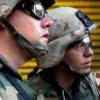
“Don’t Ask, Don’t Tell,” the unfortunate Federal law passed in 1993, is affecting the American public in ways never imagined when it was enacted. Besides prohibiting openly homosexual service members who want to serve in the military, it is affecting many straight soldiers and their families in perverse ways.
The recent call to active duty of 6000 Individual Ready Reservists (IRR) who thought they had done their duty and never expected to be on active duty again, particularly in Iraq, is the most recent example. More gays who were trained and functioning were discharged over the last 5 years than those who were called to active duty. Many of those being recalled to duty have skills which at one time they were undoubtedly proficient in. But with the expiration of several years, their training is now stale and necessitates the expense of retraining those called for deployment.
Their spouse, mother, father, children, grandparents, and employers never expected it either and their lives are disrupted as a consequence. Some of those recalled are, we can reasonably assume, gay themselves.
Unit cohesion was one of the key arguments for enacting the “Don’t Ask, Don’t Tell” law in 1993. Yet, we will now plug reservists into many units when they have no connection to that unit. In short, their retraining does not compare to those who trained as a unit and deployed together.
Does that enhance or sustain unit cohesion? I think not!
In fact, it is “Don’t Ask, Don’t Tell,” and not gay service members, that erodes such cohesion. The law singles out a group of people who must behave under different rules and standards. And when government imposes such conditions it makes gays and lesbians targets for harassment and abuse . . . which is just exactly what the record shows has happened since the military’s gay ban became law.
So today, rather than allowing gays to serve, the Army has resorted to paying excessively high enlistment and reenlistment bonuses. In fact, reenlistment bonuses with caps up to $40,000 are being paid in full, up front, to entice those who may have intended to pursue their civilian careers. Again, an unnecessary expense if those who were gay were never discharged.
And that’s just the beginning.
The “Don’t Ask, Don’t Tell” law costs American taxpayers, by conservative estimates, $30 million per year. And that number grossly understates the true cost in dollars.
Wouldn’t our money be better spent in the acquisition and provision of personal protective body armor?
Which is more important, the safety of our service members or continuing to prevent gays who want to serve their country from doing so?
The military is certainly holding onto straight service members. Military personnel are being denied separation for varying periods of time even through their enlistment contracts have been fulfilled. Some of those who have completed their career and are eligible to retire are also being denied the opportunity to do so. This “back door draft” simply skirts the law that brought about the volunteer forces.
Of course, many of these stop gap measures could have been avoided if Congress would simply repeal “Don’t Ask, Don’t Tell” and allow gays who want to serve their country to do so openly and freely.
The American people agree. The latest Gallup poll finds that 79% of the American public believe that gays should be allowed to serve openly in the military.
Now, it is up to us all – gay and straight alike – to bring the message to our elected representatives: “Don’t Ask, Don’t Tell” must be repealed, once and for all. Our nation, and our national security, will be better for it. And, at last, our nation’s fighting forces will be able to welcome the talents of every American who wants to serve, regardless of sexual orientation.
Because, as Barry Goldwater once famously said, it doesn’t matter if a soldier is straight. It only matters if he can shoot straight.
BG Virgil A. Richard, USA (Ret.) served thirty-two years of active military service and is the recipient of numerous military medals. In December 2003, was one of three senior retired military officers to acknowledge he is gay, in the New York Times. He is a member of the Honorary Board of Directors of Servicemembers Legal Defense Network and a resident of Texas.